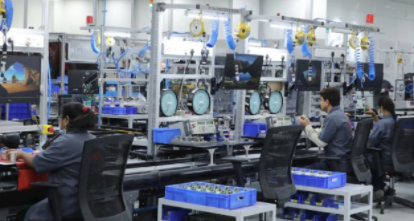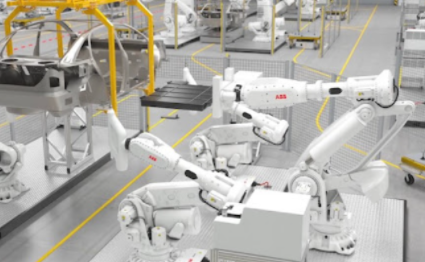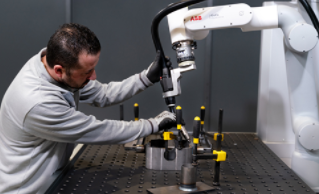ABB Industrial Dynamics and Development: Dual Wheel Drive of Technological Innovation and Strategic Layout in 2025
On July 14, 2025, Beijing - Global industrial giant ABB Group will continue to deepen technological innovation and strategic transformation in 2025, consolidating its leading position in industrial automation and sustainable development by divesting its robotics business, launching a new generation of intelligent robots, and strengthening localized production.

Business Structure Optimization: Splitting Robot Business to Unleash Value Potential
ABB Group announced the launch of a spin off plan for its robotics business, with plans to operate it as an independent listed company in the second quarter of 2026. The sales revenue of this business will reach 2.3 billion US dollars in 2024, ranking second in the world. After the spin off, it will focus more on robot technology research and market expansion. ABB CEO Martin said, "This move aims to unleash the growth potential of the robotics business through more precise capital allocation and management, while strengthening synergies among other business units of the group
After the spin off, ABB will focus on three major areas: industrial automation, electrification, and digitization, forming a clearer business architecture. The mechanical automation business unit from the original Robotics and Discrete Automation Division will be merged into the Process Automation Division to strengthen the integration of software and control technology, especially in the field of hybrid industries to form technological synergy.
Technological innovation breakthrough: AI driven robots enter the era of "autonomous multifunctionality"
At the 2025 Channel Partner Conference, Ma Sikang, Global President of ABB Robotics Business Unit, showcased the six core capabilities of next-generation robot technology: AI vision, high-precision operation, high-speed movement, flexibility, autonomous navigation, and multimodal perception. Based on this technological framework, ABB has launched three new robot series for the Chinese market:
1. Lite+Robot: Designed for the material handling needs of the electronics industry, with a compact structure and affordable cost, it is equipped with the OmniCore controller platform and can collaborate with high-end robots.
2. PoWa collaborative robot: With a speed of 5.8 meters per second, it combines industrial grade efficiency and safety, making it suitable for high dynamic collaboration scenarios.
3. The new generation IRB 1200 small industrial robot: focuses on high-end applications such as precision coating and assembly, further expanding ABB's product portfolio in the high-end manufacturing field.
Ma Sikang emphasized that the compound annual growth rate of China's mid-range robot market has reached 24%, and the proportion of collaborative robots has exceeded 10%, expected to exceed 20% by 2028. ABB responds accurately to the automation needs of the electronics, consumer goods, and general industrial fields through localized research and development and global technology integration. ”

Localized production and green transformation: investing $120 million to expand capacity
To support the energy transition, ABB announced an investment of $120 million in two low-voltage electrical product production bases in the United States to expand localized production. At present, ABB's domestic supply coverage in the United States has reached 75% -80%, and has reduced supply chain risks through tariff exemption policies. In China, ABB's Shanghai Gigafactory has obtained the "Green Factory" certification, reducing greenhouse gas emissions by 80% and generating 20% of its electricity from self-produced photovoltaics. Its EcoSolutions research and development ™ The label is verified by a third party, making the environmental performance of the product's entire lifecycle transparent.
In addition, ABB's electrification strategy is deeply rooted in the thermal power industry, launching intelligent medium voltage plant power solutions (iMV), intelligent power center solutions (iPC), and intelligent motor control centers (iMCC) to enhance power plant safety and efficiency through digital technology. For example, the iPC solution integrates Ability ™ The Chip Vision power distribution cloud platform enables remote monitoring and predictive maintenance, helping customers reduce operating costs.
Market layout: deepen the "the Belt and Road" cooperation and expand emerging areas
ABB continues to work with Chinese EPC companies to "go global" and collaborate with companies such as China Power Construction and CRRC to provide power and automation solutions for projects in Asia, the Middle East, Africa, and Latin America. As of now, ABB has participated in infrastructure construction in over 100 countries worldwide, supporting the transformation of clean energy and transportation sectors.
In the domestic market, ABB has strengthened its full value chain advantages in research and development, manufacturing, and services through the localization strategy of "Leading the Glory". For example, the Shanghai Gigafactory not only produces robots, but also sets up an 8000 square meter research and development center to develop the next generation of AI driven autonomous mobile robots (AMR) and 3D visual synchronous positioning (VSLAM) technology.
Sustainable development: Exceeding emission reduction targets, accelerating circular economy
ABB has released its first comprehensive annual report, setting a mid-term goal for 2025 to reduce its Scope 1 and Scope 2 carbon emissions by 70% and promote a 20% reduction in emissions for its first tier suppliers. In 2024, ABB's own operational carbon emissions will decrease by 65% compared to 2019, helping customers avoid 66 million tons of emissions through technology. In addition, ABB has launched a circular economy model, defined key performance indicators throughout the product lifecycle, and promoted EcoSolutions ™ Tags can improve resource utilization.

Industry trend: Collaborative robots explode, humanoid robots become new focus
According to Zhongyan Puhua's prediction, the localization rate of industrial robots in China will reach 53.3% by 2025, with sales exceeding 400000 units and a market size exceeding 150 billion yuan. ABB has achieved breakthroughs in core components such as harmonic reducers and controllers through technological innovation, and has laid out cutting-edge fields such as humanoid robots. Musk predicts that by 2040, the number of humanoid robots will surpass that of humans, and ABB is accelerating its technological reserves in this field through acquisitions and independent research and development.
In 2025, ABB will continue to lead the way in industrial automation and sustainable development with the dual engines of "spin off focus" and "technology integration". Through localized production, AI empowerment, and green transformation, ABB has not only consolidated its traditional market advantages, but also opened up growth opportunities in emerging fields such as collaborative robots and humanoid robots, providing benchmark cases for the intelligent and low-carbon transformation of the global manufacturing industry.